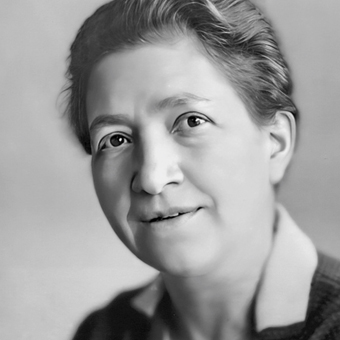
Maria Herz
d. 22 October 1950, New York City
Maria Herz numbers among the few women who made names for themselves as a composer in the early twentieth century. Born as Maria Bing in Cologne on 19 August 1878, she received piano instruction from Max von Pauer and possibly lessons in theory from Joseph Schwartz, both professors at the Cologne Conservatory. In 1901 she married the Albert Herz, a chemist, moved with him to the Manchester area, and gave birth to four children by 1910. At the same time, she began to compose, for which she had lessons with Arthur Edmund Grimshaw, and organized lecture concerts, in which she appeared as pianist, composer, and speaker.
Surprised by the outbreak of war during a stay in Germany in the summer of 1914, the family was unable to return to England and remained in Cologne. Albert Herz survived the military service but died of the Spanish flu in 1920. Newly widowed, Maria moved with her children in 1921 to be with her brother, the lawyer Moritz Bing, who had lost his wife around the same time. She began composing again, now orienting herself on modern trends. After composition lessons with August von Othegraven and Hermann Hans Wetzler, she consequently switched to Philipp Jarnach in 1927. She wrote songs and chamber music, but also solo concertos and orchestral works, partly under the name of “Albert Maria Herz.” The high point of her career was the premiere of the Four Short Orchestral Pieces, op. 8, on 15 October 1929, in Cologne’s Gürzenich Hall under Hermann Abendroth.
Threatened as a Jewess by the Nazi dictatorship that began in 1933, she moved with one son to London in 1935 and later to Birmingham, where the composer of some thirty works ceased composing and instead gave lectures on music history as she had done thirty years earlier; about forty texts have been preserved. After the war, mother and son moved to New York, where Maria Herz died on 22 October 1950.
Heinrich Aerni
